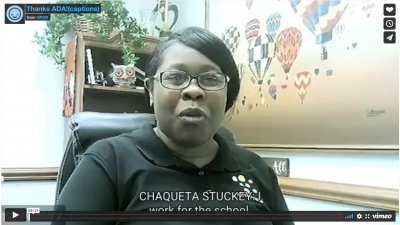Our Work
Thanks ADA!
A video by Self-Advocates Becoming Empowered
The Americans with Disabilities Act (ADA), which was signed into law on July 26, 1990, has been transformational in many ways, particularly in paving the way for persons with disabilities to access public spaces and thereby participate in their communities. Despite notable gaps in ADA implementation, perhaps more than any other disability rights law in the United States, the ADA has inculcated in a generation of persons with disabilities the expectation of inclusion in all areas of life.
Self-advocates are no exception. While society at large may associate the ADA more with architectural modifications such as wheelchair access ramps and curb cuts, the ADA has profoundly affected persons with intellectual disabilities’ expectations to be full-fledged citizens. The U.S. Supreme Court’s Olmstead v. L.C. decision, where it analyzed the ADA’s integration mandate, helped to affirm persons with intellectual and psychosocial disabilities’ rightful place in the community. So, too, have Olmstead enforcement actions taken by the Department of Justice in Oregon and Rhode Island made clear that persons with intellectual disabilities must have meaningful opportunities not only to live in integrated, community-based settings but also to work there. The ADA’s ramifications for self-advocates’ inclusion in society are broad, and over time, the disability rights community will continue to assert self-advocates’ ADA rights to work, to parent, to vote, and to learn on an equal basis with others.
This short video, produced by Self Advocates Becoming Empowered, with support from HPOD and the Institute for Community Inclusion at the University of Massachusetts Boston, vocalizes self-advocates’ profound gratitude for the real-world changes catalyzed by the ADA. From protecting their right to accommodations in the workplace, to ensuring equal access to public transportation, to safeguarding their right to live in the community, self-advocates around the country have taken note of the ADA’s thirtieth anniversary and want to raise awareness of its transformational effects among both persons with intellectual disabilities and society at large. For an easy read guide to the ADA, access the Autistic Self-Advocacy Network’s guide.


